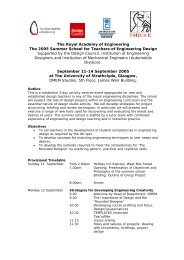Lecture Series in Mobile Telecommunications and Networks (1583KB)
Lecture Series in Mobile Telecommunications and Networks (1583KB)
Lecture Series in Mobile Telecommunications and Networks (1583KB)
You also want an ePaper? Increase the reach of your titles
YUMPU automatically turns print PDFs into web optimized ePapers that Google loves.
want to call it – that sits there <strong>and</strong> knows what can happen so chaos cannot ensue. When you put <strong>in</strong> your bid, it<br />
decides. The bid does not have to be money, but there is a mechanism by which you assign the resource. This can be<br />
some k<strong>in</strong>d of proxy measure, or it can be hard cash, or it can be someth<strong>in</strong>g else.<br />
I saw that E2R has a European programme on end-to-end reconfigurability <strong>and</strong> they had an <strong>in</strong>terest<strong>in</strong>g comment where<br />
companies came together, pooled spectrum. Everyone had a base amount <strong>and</strong> then they re-bid for the spectrum on<br />
an hourly basis or some time slot that they thought made sense. However, what actually happened was that there was<br />
some way then of redistribut<strong>in</strong>g the money that came <strong>in</strong> from that among those companies, or redistribut<strong>in</strong>g the costs<br />
or someth<strong>in</strong>g. It does not always hav<strong>in</strong>g to be trad<strong>in</strong>g <strong>in</strong> the sense – because the agents you describe –<br />
Raymond Steele: Obviously, the amount of various <strong>and</strong> spectrum <strong>and</strong> other th<strong>in</strong>gs you use, you have to pay for.<br />
L<strong>in</strong>da Doyle: Anyway, I just th<strong>in</strong>k you are talk<strong>in</strong>g about spectrum trad<strong>in</strong>g <strong>in</strong> a different way.<br />
Raymond Steele: I want to br<strong>in</strong>g back regulators <strong>and</strong> I want to get rid of people pay<strong>in</strong>g lots of money for spectrum,<br />
<strong>and</strong> bankrupt<strong>in</strong>g the <strong>in</strong>dustry.<br />
L<strong>in</strong>da Doyle: But the other side of that trad<strong>in</strong>g – as I said earlier, trad<strong>in</strong>g does not mean that people will spend the<br />
most horrible sums of money on spectrum. What actually could happen is the complete opposite, when there is a free<br />
flow of th<strong>in</strong>gs. I know that I am envisag<strong>in</strong>g the future but, if I have a piece of technology that can use this spectrum or<br />
that spectrum, then I can take either one of them, <strong>and</strong> I will not be over-obsessed about hav<strong>in</strong>g this one rather than<br />
that one. I will have a different way, <strong>and</strong> it could be cheaper for me. It might not be cheaper for the person who can<br />
only use one bunch of spectrum <strong>and</strong> are completely stuck to it. You are pre-suppos<strong>in</strong>g that spectrum trad<strong>in</strong>g means<br />
that everyth<strong>in</strong>g will be an outrageous price.<br />
Raymond Steele: Look, on any cell, <strong>in</strong> any country, there are thous<strong>and</strong>s of calls be<strong>in</strong>g cleared down <strong>and</strong> start<strong>in</strong>g up.<br />
You have to have somebody <strong>in</strong> control. It is just ridiculous that you are all negotiat<strong>in</strong>g to have that bit of the spectrum<br />
or this bit of the spectrum. It is not like that: somebody says, ‘You have that bit.’<br />
L<strong>in</strong>da Doyle: That is true, <strong>and</strong> I am not say<strong>in</strong>g that you don’t have someone <strong>in</strong> control either. Also, one of the th<strong>in</strong>gs I<br />
said at the beg<strong>in</strong>n<strong>in</strong>g is that you can easily have very confused conversations about this, if everyone starts mix<strong>in</strong>g<br />
timespans. You can talk about long-term spectrum trad<strong>in</strong>g, where people have large chunks of stability with spectrum<br />
over a larger amount of time, <strong>and</strong> lots of economists, if they see that cubic diagram, start ask<strong>in</strong>g why each of those<br />
blocks is not 10 years long. With the scale you are talk<strong>in</strong>g about, with those agents <strong>in</strong> it, you might be talk<strong>in</strong>g really<br />
short-term or you might be talk<strong>in</strong>g longer term, but it is a k<strong>in</strong>d of spectrum trad<strong>in</strong>g.<br />
Mr Pike: I have a fear that, <strong>in</strong> the long term, these approaches of <strong>in</strong>novation run the risk of becom<strong>in</strong>g a barrier to<br />
<strong>in</strong>novation. All of the techniques that have been described rely on co-operation <strong>in</strong> various ways. If they became<br />
ubiquitous across the radio spectrum space, then that would prevent any future <strong>in</strong>novations which could not cooperate<br />
for any reason, or would limit the functionality or performance to the degree of co-operation that exists <strong>in</strong> the<br />
<strong>in</strong>cumbent systems. In fact, this approach actually sows the seeds of the same problems as it is try<strong>in</strong>g to solve <strong>in</strong> the<br />
regulated regime but, if it comes across the whole spectrum space, there is not the way out for <strong>in</strong>novation that there is<br />
at the moment with different frequency b<strong>and</strong>s.<br />
L<strong>in</strong>da Doyle: I see your po<strong>in</strong>t. The way I look at the <strong>in</strong>terference issue <strong>and</strong> the shap<strong>in</strong>g <strong>and</strong> sculpt<strong>in</strong>g of your mask is<br />
that there is a basic level. You create your mask <strong>and</strong> you stay with<strong>in</strong> your mask, <strong>and</strong> you are fulfill<strong>in</strong>g the conditions as<br />
required. You can improve your performance if negotiation <strong>and</strong> co-ord<strong>in</strong>ation happens, but it does not have to happen.<br />
However, as I po<strong>in</strong>ted out, it is the case that you have certa<strong>in</strong> levels of co-ord<strong>in</strong>ation <strong>and</strong> co-operation <strong>in</strong> the use of<br />
structural equipment currently <strong>and</strong> so that m<strong>in</strong>dset already exists to some extent, <strong>and</strong> I do not see us stifl<strong>in</strong>g it <strong>in</strong> the<br />
sense you described, because it is not a necessity but it is someth<strong>in</strong>g that would give you an extra benefit. I realise that<br />
someth<strong>in</strong>g that could give you an extra benefit then becomes a necessity or could be <strong>in</strong> danger of do<strong>in</strong>g so. I also th<strong>in</strong>k<br />
that you are leav<strong>in</strong>g parameters open <strong>in</strong> many ways because you are not say<strong>in</strong>g how this has to happen or what it<br />
actually means, but you leave a great deal of choice <strong>in</strong> the <strong>in</strong>dividual entity still. That is your safeguard aga<strong>in</strong>st your<br />
fears.<br />
42 The Royal Academy of Eng<strong>in</strong>eer<strong>in</strong>g

















